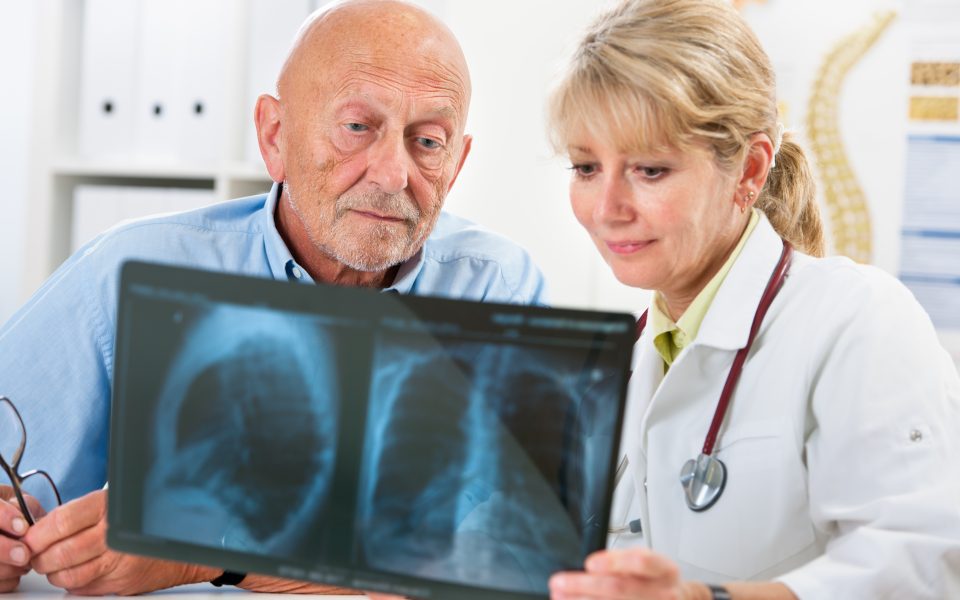Creating an Individualized Lung Cancer Treatment Plan
 The two main types of lung cancer are small cell lung cancer and non-small cell lung cancer. These categories refer to what the cancer cells look like under a microscope. Non-small cell lung cancer is more common than small cell lung cancer.
The two main types of lung cancer are small cell lung cancer and non-small cell lung cancer. These categories refer to what the cancer cells look like under a microscope. Non-small cell lung cancer is more common than small cell lung cancer.
Lung cancer is treated a number of ways depending on the type of lung cancer and how far it has spread. People with non-small cell lung cancer are typically treated with surgery, chemotherapy, radiation therapy, targeted therapy, or a combination of these treatments. People with small cell lung cancer are usually treated with radiation therapy and chemotherapy.
It is important to discuss the goals of lung cancer treatment with your healthcare provider. Some treatments may be used to control the cancer. Others are used to improve quality of life or reduce symptoms. These treatments may be combined or used alone. Your doctor will consult with you and determine a suggested treatment plan, possibly different from these general treatment options.
To learn more about the lung cancer treatments available, contact our Cancer Care team at 740-687-6900.
The most common treatment options are:
Surgery is still considered the ideal recommendation for treating early stage lung cancer. In patients whose cancer is localized, the best chance of survival is removing the tumor and surrounding lung tissue. At Fairfield Medical Center, surgery is performed by specialized thoracic surgeons with particular expertise in the treatment of lung cancer and other chest malignancies. All patients are considered first for minimally invasive surgery, although some complex cases may require a traditional, open approach. FMC’s thoracic surgeons perform video-assisted thoracic surgery (VATS) and VATS lobectomy routinely.
There are a number of different lung cancer surgery options including:
- Limited resection or segmental resection is an operation to remove only a small portion of the lung.
- Lobectomy is a surgical procedure where a large section of the lung is removed. This is the most common surgery performed for lung cancer.
- Pneumonectomy is a surgical procedure to remove the entire lung.
Chemotherapy is the use of drugs that are designed to kill fast growing cells such as cancer cells. Chemotherapy may be injected directly into a vein (by IV, or intravenously) or given through a catheter, which is a thin tube placed into a large vein and kept there until it is no longer needed. Some chemotherapy drugs are taken by pill.
Targeted agents are a newer class of drugs that are designed to act against specific weaknesses in cancer cells or surrounding supportive tissues, such as blood vessels. These drugs also can be taken by pill or by IV. In early stages of non-small cell cancer, chemotherapy may be used in conjunction with surgery to improve survival rates. In more advanced stages of non-small cell cancer and in all stages of small cell cancer, chemotherapy and targeted therapies may be used to relieve symptoms and extend life.
Radiation therapy is another option for advanced cases of lung cancer. Radiation therapy uses high-energy radiation to kill cancer cells by damaging their DNA. The radiation used for cancer treatment may come from a machine outside the body, or it may come from radioactive material placed in the body near tumor cells or injected into the bloodstream.
Radiation therapy can damage normal cells as well as cancer cells. Therefore, treatments must be carefully planned to minimize side effects. Radiation therapy is a “focused” treatment, meaning it is designed to maximize its effect on the cancer cells while minimizing any injury to normal cells. Radiation oncologists at Fairfield Medical Center offer different types of radiation therapy, including brachytherapy and radiosurgery.

